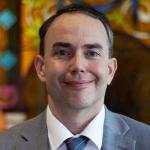
It was summertime at home. It was one of those long summer days where the daylight lingers well past 9pm. And then the summer spoke: Pop. Pop. Pop.
As a parent, I have learned to anticipate the question from my sons: fireworks or gunshots? I try to be honest but I also do not want them to be frightened. Much of the time, it is indeed fireworks being set off in the neighborhood. All too frequently, though, they are gunshots. My wife and I have resided in a three block radius for many years and we can tell the difference. Usually. Especially when we find shell casings in our alley the next morning or talk to neighbors. So, do we tell a soft lie to protect our kids’ peace of mind (fireworks again), or do we tell them the truth and then try to reassure them that they were not targeted and are safe (gunshots many blocks away)?
It seems like an impossible choice. In a world where human imperfection had not tarnished God’s perfect vision, it is something that would not be normal. Nevertheless, questions like these are part of the “normal” of countless families and communities in the U.S. and abroad. It had been normalized long before any of us existed and the daily encounters with such harm becomes exhausting.
Many practitioners of restorative justice experience a similar exhaustion. We feel it deep in our souls because of too many daily encounters with a “normal” that should never have been normalized.
Whether it is the normalizing of mass incarceration and capital punishment, a racial hierarchy that confers privilege to white and white-adjacent persons, a Church where perpetrators of harm are protected and victims marginalized, a nation built upon land taken through broken treaties and attempted genocide, our spirits are depleted by the constant moral dissonance of daily encounters with violence and harm being “normalized”.
Restorative justice asks us to recognize the abnormality of violent social relationships that are taken for granted and to create an alternative.
As we are faced with exhaustion, there are insights from a spirituality of reconciliation that can be adopted for personal restoration. Theologian-practitioner Robert J. Schreiter, C.PP.S. (1947-2021) outlined five characteristics of this spirituality, but two in particular are relevant here:
- Reconciliation and restorative justice are God’s work in which we participate;
- Reconciliation and restorative justice will remain incomplete and unfinished until God consummates all of creation.
It may not be obvious why these two principles can lead to personal restoration. After all, many of us engage in the work of seeking God's vision of justice in a world that seems to be so far from it. It is not easy to listen when the Holy Spirit calls us to personal restoration. It is not easy to trust in the subtle movements of God’s Spirit that are always flowing among us. There seems to be too much suffering, especially innocent suffering, to allow for more time to pass without finding the cure.
If we rest, laugh, and eat well, then isn’t that allowing injustice to gain ground and more violence to be inflicted? If we slow our bodies, breathe, and pray, isn’t that lost time that then allows for another person to be executed by the powers of the state?
Not necessarily.
Because bringing about God's vision of justice is beyond our power. It is God’s power and the tireless work of God’s Spirit in untying the knots of trauma and transforming injustice to healing that guarantees this. And this is good news! It means that we are not alone and that it is not up to us. If it were only up to us and our abilities, we would be consumed by the work and burn out into collapse, or, perhaps more ominously, begin to mimic, move, and behave just like the dehumanizing systems we seek to transform.
Dorothy Day famously learned this through years of seeming failure in her own ministry, “Our work is to sow; another generation [may] be reaping the harvest.” She understood that the work belonged to God and she (and countless others) was invited to participate in God’s ongoing work of creation.
I have learned not only from Schreiter but from my many students of all ages who seem to find balance in the midst of possible exhaustion. I have learned that the practice of this balance is not easy but neither is it complicated. Sufficient food, drink, exercise, and rest for the body. Abundant beauty, laughter, tears, music, and dance for our minds and emotions. And friendship, community, daily prayer, intentional breathing, and “letting go” of the illusion of ultimate personal success for our souls.
Schreiter wisely pointed out that the ministry of reconciliation is more of a spirituality than a strategy. It is a way of living, moving, and breathing in the world more so than a guide for how to repair the world. The same can be said of restorative justice. If we wish to be co-creators with God in the restoration of creation, we need to flow with God and honestly recognize when we are grappling with impossible questions and are exhausted by the deviant normality of the violence among us.
God indeed is creating a new social normality that is healing and restorative. God invites us to participate in this work and to remember that our exhaustion caused by the strain of the false normality of social violence must be honestly recognized and accepted. And, we have tools – like a spirituality of reconciliation – to find nourishment and sustenance for these times.


